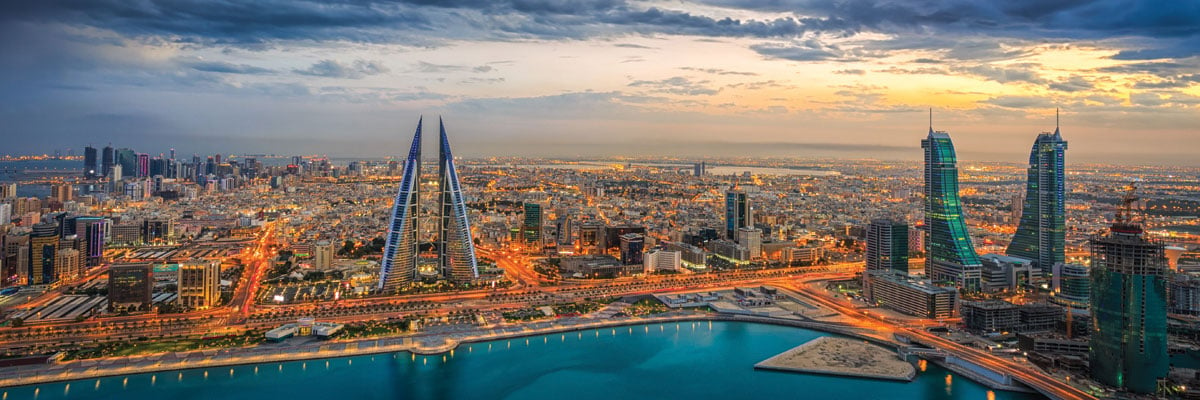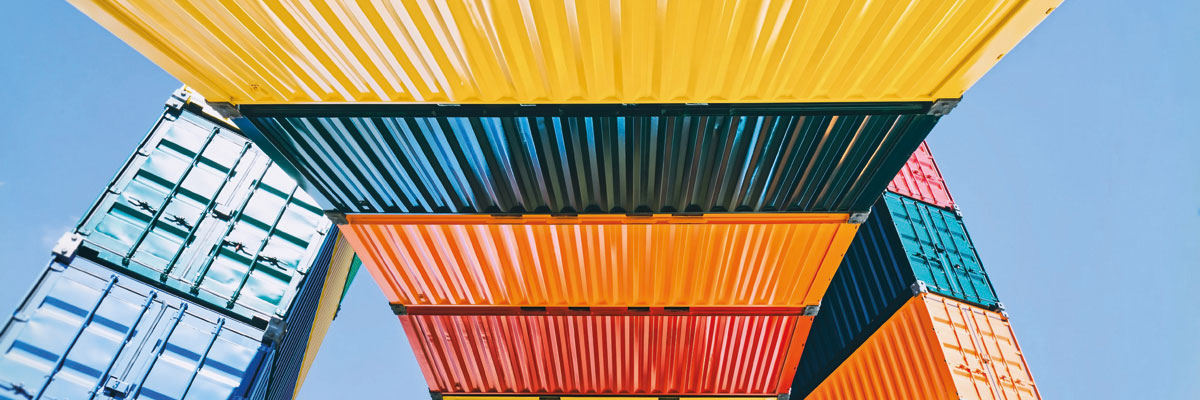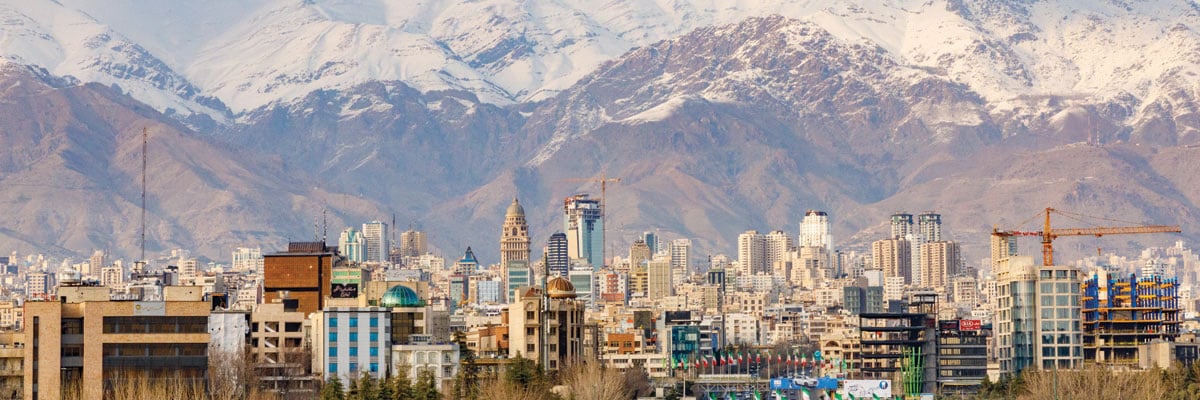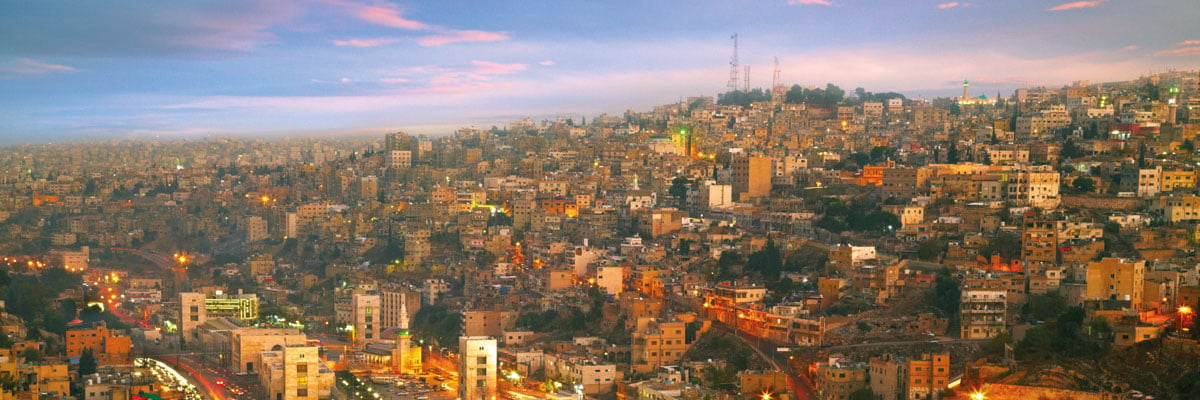Iran is situated at the geographic nexus of the Middle East, Levant, Russia, Central Asia and Indian subcontinent. It connects the Caspian Sea and the Persian Gulf, and lies on the ancient and modern route from the Mediterranean to the subcontinent and China. It shares land borders with Iraq, Turkey, Armenia, Azerbaijan, Turkmenistan, Afghanistan and Pakistan; and is a maritime neighbour of Russia, Kazakhstan, Oman, UAE, Qatar, Bahrain, Saudi Arabia and Kuwait. It is the only country connecting the two large energy fields of the Caspian Sea and Persian Gulf regions, and itself ranks among the top five countries globally in both oil and gas reserves.
Iran’s area approximates Western Europe’s. Ringed by mountains and waters, it has had stable and secure borders for centuries, and benefits from internal stability in a tumultuous region. Iran’s civilisation, culture and language have long been resonant throughout the region. Persian was the language of administration and culture for the Mongols and Arabs and in India; it is spoken in over 25 countries today, about the same as Chinese and Spanish.
Iran’s population of over 85 million people is slightly larger than Germany’s, with about two-thirds under the age of 30. A quarter of the population have university degrees and nearly 60% of university-age people are enrolled in university.
Iran is a middle-income country with a nominal 2018 GDP of about USD 450 billion (IMF). It has an industrialised and relatively diversified economy. While oil, gas and petrochemicals are preponderant, there are notable manufacturing, mining, metals, agriculture, power and water sectors. In the past decade, Iran has witnessed rapid growth in the renewables, technology and e-commerce industries as well.
An otherwise attractive market, Iran’s business environment has been significantly affected by US-led economic sanctions unprecedented in their scope and harshness. The country experienced a relatively short respite from most sanctions and a modest increase in foreign investors’ participation following the 2015 Iran nuclear deal (otherwise known as the JCPOA) and prior to the US withdrawal from the JCPOA in May 2018. Current US sanctions targeting key sectors (such as oil, petrochemicals, metals, automobiles and aviation) and the Iranian banking system have constrained trade and diminished the access of almost all business sectors to capital and cross-border banking services.
ATTRACTIONS AND CHALLENGES OF DOING BUSINESS IN IRAN
The key attractions of doing business in Iran are its large consumer market, educated workforce, diverse economy, infrastructure investment needs, potential as a regional hub and new paradigms of privatisation and foreign investment. On the other hand, US primary and secondary sanctions, risk perceptions of foreign financial institutions, an inadequate domestic financial system, a weak private sector, complex and unreceptive regulatory environment, out-dated labour and corporate laws, and FX volatility constitute the key challenges of doing business in Iran.
PRIVATISATION AND THE GOVERNMENT’S ROLE
Iran’s economy has been characterised by the wide presence of state and quasi-state entities. Against this background, the government embarked on an ambitious privatisation initiative in the early 2000s, resulting in the promulgation of a major privatisation law in 2008 and its implementation thereafter. Over a decade later, the expansion of direct government ownership is tightly controlled, but containing indirect control of state and quasi-state entities over the economy remains an elusive objective. The private sector, struggling to simultaneously cope with sanctions and a cumbersome financial and regulatory environment, still plays a relatively small role in the national economy.
Article 44 of the Constitution divides the national economy into three sectors: public, private, and cooperative. Sectors such as agriculture, commerce, and services are open to the private sector, but Article 44 requires government ownership and control of, among other things, major industries, foreign trade, mining, banking, insurance, airlines, roads and railway. Yet, the Constitution also allows for possible reorganisation of the national economy and, invoking this Constitutional flexibility, several legislative changes have expanded the economic sectors open to private participation.
The first major steps were taken between 1990 and 1995 under the first five-year development plan, where private participation in foreign trade and in the service sector was explicitly permitted and actively encouraged. Privatisation efforts continued under the third five-year development plan between 2000 and 2005, during which the government established the Privatisation Organisation charged with planning and implementing privatisation initiatives. A significant development took place on 14 June 2008 when the parliament amended the fourth five-year development plan and passed the law implementing the general policies of Principle 44 of the Constitution (commonly known as the privatisation law), which was later amended several times.
The privatisation law introduces three categories of economic activities and enterprises. The first category consists of any activities that do not fall within the purview of the second and third categories. The right to invest in, own, and manage these enterprises exclusively belongs to the private sector.
The second category consist of ‘major industries’ other than those falling within the purview of the third category. Examples include banking, insurance, power, large mines, roads and railway, as well as certain large industries with sensitive know-how and production capacity exceeding 30 per cent of the country’s needs. These enterprises are generally open to private participation, but may be subject to some restrictions, especially in industries such as banking and insurance. The government must transfer 80% of its ownership in these major industries to private and cooperatives sectors.
The third category of economic activities and enterprises are those in which private investment, ownership, and management are prohibited. Here, the private sector may only participate by way of providing financial, technical/engineering, and management services.
This third category includes the following enterprises or activities:
-
- primary telecommunication, electricity distribution and postal networks;
-
- large dams and water supply networks;
-
- oil and gas extraction and production companies;
-
- the National Iranian Oil Company;
-
- the Central Bank of Iran (as well as specified other banks);
-
- the Central Insurance of Iran;
-
- Iran Civil Aviation Organisation;
-
- Iran Ports and Maritime Organisation;
-
- manufacturing of specified security, military, and police equipment; and
FOREIGN INVESTMENT
Iranian law now allows full foreign ownership in most economic sectors, while the Foreign Investment Promotion and Protection Act 2002 (FIPPA) and its implementing regulation 2002 (the FIPPA Regulation) offer a number of incentives and protections for those who obtain a license under FIPPA. Examples include protection against nationalisation and expropriation, national treatment, guaranteed repatriation of investment proceeds and a simplified visa procedure.
FIPPA and the FIPPA Regulations set up the main legal framework for foreign investment while other, sector-specific legislation supplements this framework (e.g., Implementing Directive on Foreign Investment in Exchange Markets and Over-the-counter Markets 2010).
FIPPA allows foreign direct investment in the private sector. In the public sector, foreign investment usually takes the form of contractual arrangements such as buy-backs, BOOs and BOTs. FIPPA imposes restrictions on total foreign ownership in each sector and industry: under Article 2(d) of FIPPA, the value of goods and services produced by all foreign investments within a sector and within an industry must not exceed, respectively, 25 per cent and 35 per cent of the total value produced in such sector and such industry, respectively.
FIPPA licenses are issued by the Minister of Economic Affairs and Finance based on assessment of proposed investments by the Organisation for Investment, Economic and Technical Assistance of Iran, which is the official authority in charge of foreign investment matters. Investments by Iranian nationals which have foreign sources are also considered foreign investment under FIPPA.
Iran has entered into bilateral investment treaties with close to 60 countries, and double taxation treaties with about 45 countries
MARKET ENTRY
In most cases, those interested in doing business in Iran enter the market by:
- establishing or acquiring a subsidiary (including for the purpose of incorporated joint venture arrangements);
- opening a branch or representative office;
- establishing an unincorporated joint venture arrangement with local entities; or
- entering into a sale or distribution agreement with a local entity.
Establishing or acquiring a subsidiary allows the parent company to engage in the full range of corporate activities, but the subsidiary will be taxed like a domestic company. Setting up new subsidiaries entails going through time-consuming, and at times burdensome incorporation and registration process. In contrast, acquisition of an existing local entity may be attractive particularly where the entity holds the necessary licenses, land or other relevant assets or know-how. However, such acquisition requires careful due diligence to avoid inadvertent assumption of existing liabilities. In recent years, there has been an increase in the number of M&A transactions in Iran, resulting in an increase in the number of acquisition opportunities for potential foreign investors.
Foreign companies who wish to have a limited local presence may open a branch or representative office, which can engage in a number of activities such as conducting market research, marketing, overseeing performance of contracts, providing after-sale services or providing services in relation to transportation, insurance and inspection of sold goods. A branch does not need to take a corporate form, and is exempt from corporate income tax as long as it does not conduct any commercial activity. In conducting regular business through a branch or a representative office, the parent company must ensure compliance with labour laws and financial reporting requirements.
Entering into joint venture arrangements with local counterparts (whether or not through a joint venture company) is also a common approach but requires careful structuring to avoid legal, tax and operational hurdles. Unincorporated joint ventures are governed by contract law principles, and there is no requirement to publicly announce or register them.
Finally, sales and distribution agreements are another option allowing market presence through local representatives or agents while managing liabilities and risks. Their key advantage is the flexibility they afford the parties in determining the extent of their respective rights and obligations.
CORPORATE MATTERS
Common corporate vehicles used by foreign participants to establish an Iranian entity are private joint stock companies and limited liability companies. However, corporate registration and maintenance in Iran can be quite demanding due to a formalistic and sometimes inconsistent approach taken by the corporate registrar; it therefore requires time and involvement of senior management to avoid the onerous liabilities for a company and its directors that can follow from unintended lapses.
|
Private joint stock companies |
Limited liability companies |
| Minimum capital |
IRR 1 million |
IRR 1 million |
| Minimum number of share- or stock-holders |
Three |
Two |
| Liability of each share- or stock-holder |
Limited to the nominal value of shares held by shareholder |
Limited to amount of capital contribution by stockholder |
| Board of directors |
At least three members from amongst shareholders, elected for a maximum period of two years |
At least one member from amongst stockholders or non-stockholders |
The Commercial Code 1932 recognises seven types of corporate vehicles: general partnership; limited partnership; limited liability company; public and private joint stock company; cooperative society for production and consumption; joint stock partnership; and proportional liability partnership. Among these, limited liability companies and private joint stock companies offer stockholders more control and better management of liabilities, hence their popularity with foreign investors. The principal features of these two are as follows:
REGULATORY ENVIRONMENT.
Iran has a complex, multi-layered, overlapping and at times ambiguous regulatory environment, and a significant number of new regulations are issued each year. In certain areas, such as import-export, foreign exchange or banking, regulation can change with dizzying speed. This constantly evolving regulatory landscape requires business owners and managers to keep abreast of new regulatory requirements and opportunities to manage their costs and risks.
Iran is a mixed civil and Islamic law jurisdiction with four branches of power: the office of the Supreme Leader, the legislative branch, the executive branch, and the Judiciary. All four are vested with some legislative authority to pass laws or make regulations.
Legislative power is primarily vested in the Parliament, which passes legislation (including annual budget and five-year development plan laws) and ratifies international treaties to which Iran ascends. Legislation passed by the Parliament does not automatically become law however. To ensure compatibility with Islamic law and the Constitution, an oversight body called the Guardian Council reviews the legislation. Once legislation passed by the Parliament is approved by the Guardian Council, the legislative process is concluded and the legislation comes into force 15 days after its publication in the Official Gazette (unless the legislation provides for a different entry-into-force date). In the event of disagreement between the Parliament and the Guardian Council over a legislation, a yet higher legislative body named the Expediency Council will make the final decision.
The office of the President as the head of the executive branch and the Council of Ministers play a significant role in development of Iran’s regulatory environment. Draft bills submitted by the executive branch to the Parliament must first be approved by the Council of Ministers. Moreover, each Minister individually, and the Council of Ministers collectively have extensive law-making powers through issuing administrative directives and implementing regulations under the laws passed by the Parliament. Such executive directives and regulations must not, however, contradict the provisions of the laws passed by the Parliament; otherwise, they will be declared void.
The legislative power of the Judiciary is administrative in nature, and is generally limited in scope to judicial processes. Once again, administrative directives by the head of the Judiciary must not contradict the provisions of the laws passed by the Parliament.
In addition, designated regulators in various sector are in charge of regulating the activities falling under their supervision. For instance, the Central Bank of Iran, the Central Insurance of Iran and the Securities and Exchange Organisation of Iran act as the regulator for, respectively, the banking system, the insurance industry and the capital markets.
BANKING
Nationalisation of the banking system following the Islamic revolution of 1979 resulted in almost two decades of government monopoly. The monopoly came to an end in 2000 when the Parliament passed the Law Authorising Establishment of Non-Governmental Banks. Currently, about two third of the major banks in Iran are privately owned although the banking system as a whole remains government owned or controlled.
Established in 1960, the Central Bank of Iran (CBI) is in charge of the national monetary policy. Its responsibilities include issuing currency, regulating Iranian rial- and foreign currency transactions, monitoring and regulating export and import of currency, and regulating banks and financial institutions. The CBI also acts as the government’s banker and has broad authorities in relation to sale and purchase of bonds (issued by the government, foreign governments or international financial institutions) and in relation to offering loans and credit to the government.
In an attempt to bring banking practices in compliance with the principles of Islamic finance, a major overhaul of the banking law took place in 1983. The defining feature of the resulting “Islamic banking” system was the official prohibition against payment of pre-determined interest. This in turn limited the framework of bank financing in Iran to profit-and-loss-sharing arrangements (sometimes called “civil participation agreements”). Nevertheless, conventional financing continued to be used by Iranian banks in their international borrowing.
Bank loans are the most important source of debt financing, although banks are undercapitalised and laden with large arrears from the government, credit is limited, financing instruments are rigid and regulations can be out-dated. The government budget has limited development funding, and most project and infrastructure funding comes from the country’s sovereign wealth fund, the National Development Fund (NDF). A number of banks act as agents and intermediaries for NDF’s Iranian rial and foreign currency loans, which support projects that meet NDF’s mandate.
While Iran has a legal framework allowing foreign banks to open a local branch or representative office, there is no longer a significant presence of international banks due to sanctions. Nonetheless, Iran has recently taken measures to bring its banking standards closer to international standards and best practices, including by attempts to implement the Basel Accords and the passage of anti-money laundering and financial crime legislation.
Capital markets. The Tehran Stock Exchange, founded in the 1960s, is the oldest in the Middle East, and its market capitalisation in July 2019 was approximately USD 90 billion (at the prevailing market exchange rates). The debt capital market is much smaller, and is dominated by government debt. All onshore debt financing, whether through banking or capital market instruments, is Sharia-compliant.
The primary law governing capital markets is the Securities Market Act (SMA), while the Exchange and Securities Supreme Council (ESSC) and the Securities and Exchange Organisation (SEO) are the principal regulators. The ESSC is in charge of introducing new financial instruments, monitoring the SEO and proposing capital market regulations to be approved by the Council of Ministers. The SEO is responsible for (i) registering and issuing IPO licenses; (ii) issuing, suspending and terminating licenses for regulated financial institution (e.g., brokers, broker-dealers, investment banks, investment advisory companies, and retirement funds); and (iii) generally taking measures aimed at protecting investors.
In the primary market, issuers must comply with strict disclosure requirements. Failure to do so may result in civil and criminal liabilities not only for the non-compliant issuer but also for those involved in preparing the prospectus, such as lawyers and accountants. Following an IPO, the issuer must comply with ongoing disclosure requirements including with respect to any material information. SMA and the SEO directives regulate the activities and the participants in the secondary market. For instance, SMA requires the exchanges to publicly disclose the number and the price of traded securities in accordance with the SEO directives.
Foreign investors, whether natural or legal, may participate in the Iranian capital markets provided that they obtain, and comply with, a trade license from the SEO. The license specifies a transaction limit, which generally reflects the investment limits set out in the Foreign Investment Promotion and Protection Act (unless the ESSC imposes other restrictions).
In the debt market, sukuk may be issued by both private and public issuers. The principal law allowing creation of new sukuk structures is the Law on Development of New Financial Instruments and Institutions for Facilitating the Implementation of the General Policies of Article 44 of the Constitution. Under the current framework, for every new sukuk financing a unique special purpose vehicle (SPV) must be established. Such SPV then acts as the proxy between the sukukholders and the issuer in accordance with the terms and conditions of the sukuk. These SPVs are in the form of limited liability companies, are regulated by the ESSC’s Directive on Operation of Special Purpose Vehicles, and are managed by the Capital Market Central Asset Management Corporation.
CURRENCY EXCHANGE
Iran has long had a multiple-rate FX regime. Currently, there is a low, official rate exclusively allocated by the Central Bank for import of “essential goods” (mostly food and medicine), a much higher open market rate, and an intermediate “NIMA” rate for imports of non-essential goods. The current FX regime, which was introduced in April 2018 following the significant devaluation of the Iranian rial, is still in flux and further transformation in the near future can be expected. Therefore, it is essential for businesses for whom foreign currency is material to closely monitor and respond to changes in the FX regulatory environment.
The NIMA platform (also known as Iran’s Forex Management Integrated System), was established in April 2018 and is designed to allow rate determination in a managed supply-and-demand environment. Exporters are under the general obligation to repatriate their export revenues, which are intended to support the currency needs of importers of non-essential goods via NIMA platform.
AML
In recent years, concerns over anti-money laundering standards and recommendations of the Financial Action Task Force (FATF) have led the legislative and executive branches of the government to take major steps to pass several AML laws and regulations. A Financial Intelligence Unit has been established within the Ministry of Economic Affairs and Finance, and AML compliance and enforcement is gradually emerging as a significant area of concern for larger business owners, financial institutions and judicial authorities. Despite these developments, Iran’s AML regime is not yet functionally comparable with international standards and best practices.
LABOUR
The Labour Law 1990 and the Social Security Law (SSL) covers many aspects of employment relations, most of which are mandatory. Failure to fulfil employee-related social security and tax obligations could in particular have significant adverse consequences for the company and its directors and principal shareholders.
At the beginning of each year, the Supreme Labour Council announces new minimum wage as well as the wage brackets above the minimum wage for the year. In its deliberation, the Council takes into account economic factors such as inflation. Wage discrimination on the basis of age, sex, race, nationality, or political and religious beliefs is prohibited.
A key responsibility of employers is to insure their employees through the Social Security Organisation, failing which may result in criminal consequences. For each insured employee, the social security insurance premium under the SSL is 30 per cent of that employee’s salary, of which 7 per cent is paid by the employee, 20 per cent by the employer and 3 per cent by the government.
An employment contract may only be terminated in the event of: (i) demise, total disability, retirement, or resignation of the employee; (ii) expiry of the term of a temporary employment unless—explicitly or implicitly—renewed; (iii) completion of the work specified in a limited employment contract; and (iv) termination circumstances agreed in the employment contract.
Where available, employee-employer disputes must be first brought before Islamic Council of Labour for reconciliation. If there is no access to the Council, the dispute may be brought before the relevant Guilds Association or, alternatively, be resolved by the representatives of the employee and the employer. If reconciliation is not achieved, the dispute may be brought before the Labour Assessment Board, whose decisions can be appealed to the Labour Dispute Settlement Board within 15 days for a final decision.
To be employed in Iran, foreign nationals need to obtain work visa and work permit. The permit is obtained from the Ministry of Labour (MoL). The MoL may issue, renew or extend work permits for no more than one year. Nevertheless, the following do not need work permit: (i) subject to the approval of the Ministry of Foreign Affairs, foreign nationals solely working on diplomatic or consular missions, and employees and experts of the United Nations and its affiliated organisations; and (ii) subject to reciprocal treatment and the approval of the Ministry of Culture and Islamic Guidance, foreign journalists. Failure to secure and maintain a work permit where required may expose the employer to financial penalties, 91-180 days of imprisonment, or both.
TAXATION
The Direct Taxation Act is the principal law governing taxation in Iran. Unlike many other jurisdictions, capital gains, excises, and interest incomes are not taxable. In general, domestic and foreign nationals are subject to similar taxation but some differences exist. Iranian National Tax Administration (INTA) is the key tax authority in the country. Iran has entered into double taxation avoidance treaties with about 45 countries.
Personal tax: Iranians, whether residing in Iran or abroad, are subject to 0 to 35 per cent income tax depending on their income bracket. The annual budget law followed by a directive of the INTA determines the salary tax brackets for each tax year. Foreign nationals’ taxable income is subject to tax rates ranging from 10 to 30 per cent, primarily based on the type of activities conducted in Iran.
Corporate tax: The Iranian tax code generally imposes a flat 25 per cent tax rate on corporate income, subject to numerous reliefs, exemptions and reduced rates based on, among other things, industry sector (e.g., manufacturing, power generation or mining) or location (e.g., special economic zones, free trade-industrial zones or designated “less developed” areas) of the enterprise. In free trade-industrial zones, for instance, there is a 20-year exemption from property and income taxes, starting from the issue date of the taxpayer’s activity license. Transfer of listed shares is subject to taxation at 0.5 per cent of trading value, while transfer of unlisted shares or equity ownership of corporate entities is subject to taxation at 4 per cent of nominal value.
Withholding tax: Employee salaries paid by employers are subject to a withholding tax of 10 to 35 per cent depending on salary amount.
Value added tax (VAT): For almost all products and services VAT is currently fixed at 9 per cent. Some products such as tobacco, diesel, and plane fuel are subject to higher VAT while others such as medical and non-processed agricultural products or banking services are exempt from VAT.
DISPUTE RESOLUTION
Most business disputes in Iran go through the court system, which is under-resourced and lacks the necessary expertise to deal with sophisticated commercial disputes. As a result, in recent years there has been a growing interest in the use of ad hoc or institutional arbitration to resolve commercial, investment and other business disputes. An arbitral award is generally final and enforceable unless it is nullified pursuant to the applicable arbitration rules or the general provisions of the Code of Civil Procedure. The two local arbitration institutions are Tehran Regional Arbitration Centre (TRAC) and the Arbitration Centre of Iran Chamber of Commerce (ACIC), although the parties may choose arbitration by a foreign institution such as the International Chamber of Commerce or the London Court of Arbitration. Government entities must obtain the approval of the Council of Ministers, and in certain cases including where there is a foreign counterparty, the approval of the Parliament, before they can submit to arbitration. Iran is a party to the 1958 New York Convention on Recognition and Enforcement of Foreign Arbitral Awards.
Most small civil claims are first brought before the Dispute Resolution Councils, with possible appeal available to the courts of first instance. Other claims are brought directly before the courts of first instance, with possible appeal to the courts of appeal and the Supreme Court.
There is no statutory timeframe for hearing civil cases, and a first instance hearing may take 9 to 24 months, depending on the complexity of the matter and the court docket.
In certain circumstances, the law requires use of an alternative dispute settlement mechanism. For instance, in contractor agreements with government entities, a specialised expert panel of the Planning and Budget Organisation hears any disputes against the concerned government entity. In addition, capital markets disputes among issuers, investment advisors, investors, brokers and the regulator must be resolved by the arbitral tribunal of the Securities and Exchange Organisation.
Other forms of dispute resolution such as mediation or expert determination may be chosen by commercial parties but are not institutionally structured or statutorily regulated.







